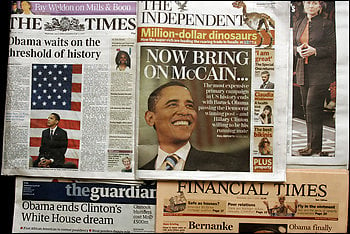We have speculated before — along with many others — about Obama's impact on foreign attitudes toward the United States. But with the Democratic nomination now safely in his hands, this is no longer an academic question. As many foreigners as Americans seem to have celebrated the milestone that Obama's victory represents, encouraged by worldwide media coverage that resembled more a general election victory than a party nomination.
As the Washington Post and many others reported, there was an atmosphere of excitement around the world when the news finally broke. Obama's grandmother in Kenya speaking movingly about the long road traveled, West Europeans declaring that Obama's victory restores their faith in America's values, Indonesians claiming him as a native son, Japanese excited because they have a city whose name is Obama (!).
This is clearly much more — or less — than a reaction to Obama's political views. Muslims tuning in from the Middle East had to take note that the "presumptive" candidate's first act was to address the pro-Israel lobby, AIPAC, and declare his "unshakable commitment" to Israel's security. It was a speech whole sections of which, mutatis mutandis, could have come out of the Bush White House. Note, in fact, how the drumbeat of anti-Muslim insinuation against Barack Hussein Obama forces him to dial up his pro-Israel rhetoric:
I will bring to the White House an unshakable commitment to Israel's security. That starts with ensuring Israel's qualitative military advantage. I will ensure that Israel can defend itself from any threat – from Gaza to Tehran. Defense cooperation between the United States and Israel is a model of success, and must be deepened. As President, I will implement a Memorandum of Understanding that provides $30 billion in assistance to Israel over the next decade – investments to Israel's security that will not be tied to any other nation. First, we must approve the foreign aid request for 2009. Going forward, we can enhance our cooperation on missile defense. We should export military equipment to our ally Israel under the same guidelines as NATO. And I will always stand up for Israel's right to defend itself in the United Nations and around the world.
Of course, Barack Obama does emphasize diplomacy — "clear-eyed" and "aggressive" — and does not talk, as his erstwhile opponent did, of "obliterating" Iran with a nuclear reprisal. However, at a time when Israeli Prime Minister Olmert stands accused of taking money under the table from an American businessman, a year after President Katsav plea-bargained and resigned his way out of sexual harassment and rape charges, there are more than a few things wrong on the Israeli side of the agenda. Such things do not get mentioned when talking to AIPAC.
Fareed Zakaria was right to note that we are doubtless witnessing a temporary phenomenon in the world's reaction to Barack Obama — a celebration of the man, rather than his policies. It is a moment when, because of Obama's remarkable personal story and inspirational rhetoric, we have an opportunity to restore America's credibility. But whether we do so will depend on policies and their execution, not just an impressive biography and commitment to change.